The Health bulletin [serial] - University of North Carolina at Chapel Hill
The Health bulletin [serial] - University of North Carolina at Chapel Hill
The Health bulletin [serial] - University of North Carolina at Chapel Hill
- No tags were found...
You also want an ePaper? Increase the reach of your titles
YUMPU automatically turns print PDFs into web optimized ePapers that Google loves.
August, 1951<strong>The</strong> <strong>Health</strong> Bulletin(2) measures employed to protect himagainst specific diseases, and (3) theextensive research activities carried onin looking for better methods to controlthe diseases th<strong>at</strong> might <strong>at</strong>tack him. Althoughsome <strong>of</strong> these activities wereplanned and supervised by divisions <strong>of</strong>the Surgeon General's <strong>of</strong>iBce not formallyincluded in the preventive medicineservice, they were a part <strong>of</strong> the totalprogram.General health measures included thephysical selection <strong>of</strong> healthy recruits;the provision <strong>of</strong> healthful clothing,housing, nutrition, and physical training;intensive training in hygiene; andsanitary control <strong>of</strong> the soldier's environment.<strong>The</strong> l<strong>at</strong>ter was handled cooper<strong>at</strong>ivelyby the division <strong>of</strong> sanit<strong>at</strong>ionand hygiene and the division <strong>of</strong> sanitaryengineering. It included providingfor safe food and w<strong>at</strong>er supplies, forthe sanitary disposal <strong>of</strong> wastes, and thecontrol <strong>of</strong> many insect vectors androdent reservoirs <strong>of</strong> disease. <strong>The</strong> importance<strong>of</strong> sanit<strong>at</strong>ion was emphasized inthe training courses <strong>of</strong> all military personneland special intensive training inthe subject was provided for the MedicalService in the Medical Field ServiceSchool <strong>at</strong> Carlisle Barracks. <strong>The</strong> sanitaryprogram was oper<strong>at</strong>ed efficiently,especially in fixed install<strong>at</strong>ions, but itwas difficult to maintain adequ<strong>at</strong>e sanit<strong>at</strong>ionvmder comb<strong>at</strong> conditions and thefilth-borne diarrheas and dysenteriesand certain insect-borne diseases, especiallymalaria, caused much sickness incertain overseas loc<strong>at</strong>ions. In the continentalUnited St<strong>at</strong>es this program wasrel<strong>at</strong>ively successful. <strong>The</strong> extensive workdone by the Army in its camps andposts was supplemented in the surroundingcivilian areas by sanitary programsoper<strong>at</strong>ed through the U. S. Public<strong>Health</strong> Service by St<strong>at</strong>e health departments.This cooper<strong>at</strong>ive arrangement,which was initi<strong>at</strong>ed by the preventivemedicine service in 1940, was <strong>of</strong> gre<strong>at</strong>importance. It produced results whichhave had a pr<strong>of</strong>ound influence on thepresent st<strong>at</strong>us <strong>of</strong> civilian and militaryhealth in the United St<strong>at</strong>es.<strong>The</strong> Conquest <strong>of</strong> Malaria in the UnitedSt<strong>at</strong>es.—A spectacular example is affordedby the present st<strong>at</strong>us <strong>of</strong> malaria.In 1940 the Army started an intensiveprogram for the elimin<strong>at</strong>ion <strong>of</strong> mosquitoesin all military install<strong>at</strong>ions inthis country. At our request, the U. S.Public <strong>Health</strong> Service supplemented thisprogi'am with an extra-military mosquitocontrol campaign. <strong>The</strong> Army programcost about 17 million and th<strong>at</strong> <strong>of</strong>the U. S. Public <strong>Health</strong> Service about 19million dollars. Considered as a whole,this was the most extensive mosquitocontrolprogram ever oper<strong>at</strong>ed in anycountry in the history <strong>of</strong> the world. Itwas highly effective and although millions<strong>of</strong> men were trained in camps loc<strong>at</strong>edin the Deep South, rel<strong>at</strong>ively fewsoldiers contracted malaria in thiscountry. An important postwar outgrowth<strong>of</strong> this joint program was theestabhshment <strong>of</strong> the CommunicableDisease Center with headquarters inAtlanta, Georgia, which is continuingthe fight against malaria and otherdiseases and is now helping to mobilizeour eJitra-miiltary defenses for the presentemergency. It is reassuring to knowth<strong>at</strong> malaria, which once was a majoraffliction in the South, is now disappearing.Last year the St<strong>at</strong>e <strong>of</strong> Mississippi<strong>of</strong>fered a bonus <strong>of</strong> $10.00 to anydoctor who could find a new case <strong>of</strong>malaria, and not one case was reported.This story <strong>of</strong> the conquest <strong>of</strong> malariain the United St<strong>at</strong>es is only one example<strong>of</strong> how the preventive medicine program<strong>of</strong> World War II exerted a powerfuleffect on the postwar health <strong>of</strong> then<strong>at</strong>ion.New Insecticides.—Another outstandingcontribution made by om: department<strong>of</strong> sanit<strong>at</strong>ion and hygiene was theiniti<strong>at</strong>ion and coordin<strong>at</strong>ion <strong>of</strong> an extensiveresearch program aimed <strong>at</strong> thedevelopment <strong>of</strong> more effective agentsand methods with which to improvemilitary hygiene and sanit<strong>at</strong>ion. One <strong>of</strong>the most helpful results <strong>of</strong> this workwas the development <strong>of</strong> new wartimeinsect repellents and insecticides whichhave been used so successfully for thecontrol <strong>of</strong> typhus, bubonic plague, dengue,malaria, and other important diseases.<strong>The</strong> story <strong>of</strong> the development <strong>of</strong>these new agents is a romantic tale <strong>of</strong>


![The Health bulletin [serial] - University of North Carolina at Chapel Hill](https://img.yumpu.com/47242858/153/500x640/the-health-bulletin-serial-university-of-north-carolina-at-chapel-hill.jpg)
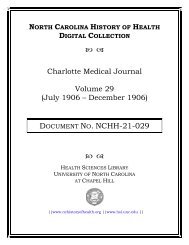
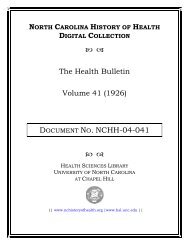
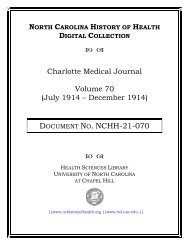
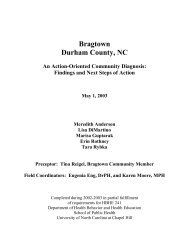
![Bulletin of the North Carolina Board of Health [serial] - University of ...](https://img.yumpu.com/48032016/1/153x260/bulletin-of-the-north-carolina-board-of-health-serial-university-of-.jpg?quality=85)
![The Health bulletin [serial] - University of North Carolina at Chapel Hill](https://img.yumpu.com/47603625/1/169x260/the-health-bulletin-serial-university-of-north-carolina-at-chapel-hill.jpg?quality=85)
![The Health bulletin [serial] - University of North Carolina at Chapel Hill](https://img.yumpu.com/43204263/1/172x260/the-health-bulletin-serial-university-of-north-carolina-at-chapel-hill.jpg?quality=85)
![The Health bulletin [serial] - University of North Carolina at Chapel Hill](https://img.yumpu.com/41981074/1/163x260/the-health-bulletin-serial-university-of-north-carolina-at-chapel-hill.jpg?quality=85)
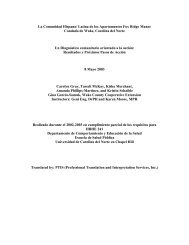
![The Health bulletin [serial] - University of North Carolina at Chapel Hill](https://img.yumpu.com/40912928/1/164x260/the-health-bulletin-serial-university-of-north-carolina-at-chapel-hill.jpg?quality=85)
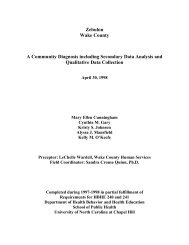
![The Health bulletin [serial] - University of North Carolina at Chapel Hill](https://img.yumpu.com/35643061/1/167x260/the-health-bulletin-serial-university-of-north-carolina-at-chapel-hill.jpg?quality=85)
![Biennial report of the North Carolina State Board of Health [serial]](https://img.yumpu.com/34024350/1/166x260/biennial-report-of-the-north-carolina-state-board-of-health-serial.jpg?quality=85)
